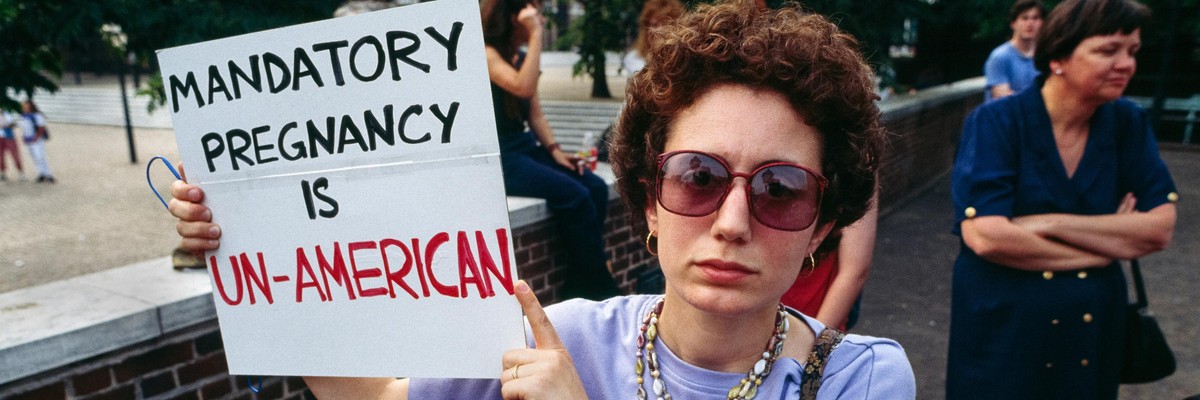Republican Gov. Kevin Stitt of Oklahoma was denounced Tuesday for signing into law one of the most extreme forced-pregnancy bills in the United States, a law pro-choice advocates argue is blatantly unconstitutional and must be challenged.
Stitt signed S.B. 612, which targets healthcare professionals by making it illegal for them to provide abortions at any stage of pregnancy with only a narrow exception for pregnant patients who are at risk of death unless their pregnancies are terminated.
"Abortion bans are never about safety. They're about coercion and control."
Under the law, which is scheduled to go into effect this summer, healthcare workers who provide abortion care could be charged with a felony and face as much as 10 years in prison as well as a $100,000 fine.
Stitt and other Republicans have been "emboldened" by the U.S. Supreme Court's refusal to stop Texas from enacting its own forced-pregnancy law, known as S.B. 8, last year, said Nancy Northrup, president and CEO of the Center for Reproductive Rights (CRR).
"Oklahoma's total abortion ban is blatantly unconstitutional and will wreak havoc on the lives of people seeking abortion care within and outside the state," Northrup said. "We've sued the state of Oklahoma ten times in the last decade to protect abortion access and we will challenge this law as well to stop this travesty from ever taking effect."
The Supreme Court is expected to rule on Mississippi's 15-week abortion ban later this year, and the state has asked the court to overturn Roe v. Wade, which affirmed in 1973 that women in every U.S. state have the constitutional right to obtain abortion care.
Reproductive rights advocates have warned since S.B. 8 went into effect that the court's right-wing majority is likely to overturn the ruling, which would nullify any legal challenges to S.B. 612 in Oklahoma and would ensure other abortion bans can also go into effect.
"We are at a tipping point for abortion rights nationwide," tweeted Alexis McGill Johnson, president of Planned Parenthood Action Fund.
"This ban, like all abortion bans, will harm real people--people who are making a decision that they know will be best for themselves, their lives, their families, and their futures," Johnson added in a statement
In addition to S.B. 612, Oklahoma Republicans who control the state legislature are pushing two bills modeled on a Texas law passed last year that took enforcement of its abortion restrictions out of the hands of the state by allowing ordinary citizens to sue anyone they believed helped a patient obtain an abortion. Those bills would go into effect immediately if Stitt signs them into law.
"We want to outlaw abortion in the state of Oklahoma," Stitt said Tuesday.
Advocates in Oklahoma warned that the three anti-choice bills will harm healthcare not just for 900,000 women of reproductive age in the state but also for women across the Great Plains region.
"Oklahoma health centers are currently seeing dozens of patients each day who have left Texas to seek abortions," said the group. "Some providers have reported a nearly 2500% increase in Texas patients in the last four months of 2021, compared to the same period in 2020. And in turn, Oklahomans have started leaving for care in Kansas, Colorado, Arkansas, or even states further afield. If Oklahoma health centers are forced to stop providing abortion, the ripple effect will be felt throughout the region."
"Oklahoma's extreme law banning abortion is just one more reason we need federal protections for the right access abortion."
One advocate warned that Oklahoma's effort to "effectively eliminate" abortion care, in the words of S.B. 612 author state Sen. Nathan Dahm, will only "push people further to the margins, force people to carry pregnancies that are dangerous to their own health, or take greater risks to find abortion care wherever they can."
"The people of our region deserve access to essential healthcare in their own communities," said Myfy Jensen-Fellows, advocacy director for Trust Women, a women's health clinic in Oklahoma City. "No one should have to travel out of state to access abortion care. No one should be forced to carry a pregnancy that they do not want, or that is dangerous to their health."
The White House responded to Stitt's decision Tuesday by calling on the U.S. Congress to protect abortion rights in every state by passing the Women's Health Protection Act (WHPA), which would protect healthcare professionals' right to provide abortions and patients' right to recieve care.
Passage of the WHPA "would shut down these attacks and codify this long-recognized, constitutional right," said White House Press Secretary Jen Psaki.
The U.S. House passed the WHPA last year, but right-wing Democratic Sen. Joe Manchin joined every Republican senator in blocking the legislation last month.
"Oklahoma's extreme law banning abortion is just one more reason we need federal protections for the right access abortion," said the Pro-Choice Caucus in Congress Tuesday.
Physicians for Reproductive Health (PRH) said it was "absolutely disgusted" by Stitt's signing of S.B. 612 and his claim that he was approving the bill in support of "families."
"When people have access to abortion, families and communities thrive," tweeted PRH. "There is a direct tie between abortion bans and devastating maternal health outcomes. Abortion bans are never about safety. They're about coercion and control."

